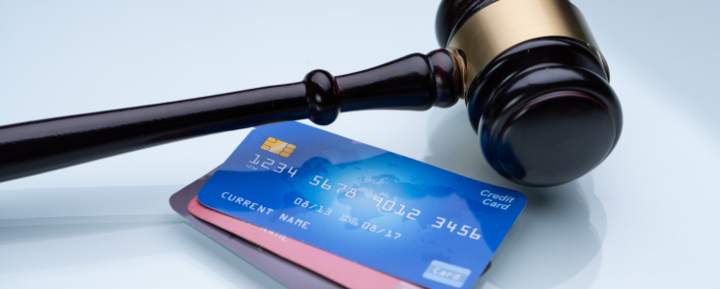Having a charge-off on your credit report isn’t a great situation. For one, your credit score will suffer. Debt collectors can also call and message you constantly to get you to pay up for your delinquent debt. So, if you’re ready to resolve your charged-off debt once and for all, you might wonder: Should I pay a charge-off in full or settle it?
Your chosen strategy will depend on your debt level, your ability to repay, and other relevant factors. Here’s what you should know when handling a charge-off on your credit report.
What Is a Charge-Off?
A charge-off is a term used by credit card companies and other creditors or lenders when a debt is written off their books and considered unlikely to be collected because the borrower has made no payments for a significant amount of time.
After a certain period of delinquency, the creditor writes off the debt as a loss for accounting purposes. This process is known as “charging off” the debt and typically occurs after approximately 180 days. It allows companies to take a tax deduction on uncollected debt, which is considered a loss for the company.
The debt, however, is not forgiven or forgotten. The debtor is still legally obligated to pay it. A charge-off can also severely harm your credit score. That can make it harder to qualify for loans or credit cards in the future. Moreover, creditors can continue to try to collect the debt. You could even be sued for the amount you owe.
Paying a Charge-off in Full
Paying a charge-off in full means that you’ve paid the entire outstanding balance that was owed on the debt after the original creditor charged it off. The debt will then be considered resolved.
The Implication of Paying Charge-offs in Full
When you pay the full balance, the account’s status on your credit report will be updated to show that it has been paid. It doesn’t remove the charge-off from your credit report, but changes the status to “Paid” or “Paid in full.”
This is important because it shows future lenders that you eventually took responsibility and paid off your debt. The charge-off itself is a negative item on your credit report. However, a paid charge-off is viewed more favorably than an unpaid one.
The charge-off will remain on your credit report for seven years. Over time, its impact on your credit score will lessen. That’s especially true if you continue to manage your other credit obligations responsibly.
The Benefits of Paying in Full
There are some benefits to paying off a charged-off account:
- Better credit report notation. A paid-in-full status is better for your credit report than a settled status. Future lenders prefer to see that you’ve paid what you owe in full rather than settling for less.
- Avoids tax consequences. The IRS may consider forgiven debt as taxable income, and you may be required to pay taxes on it. By paying the debt in full, you avoid potential tax consequences.
- Satisfies the debt completely. Paying the debt fully means you won’t have to worry about any remaining balance or further collection attempts.
Settling a Charge-off
Settling a charge-off debt means negotiating with the creditor to pay less than the full amount you owe. This is usually done as a lump-sum payment, although you can sometimes negotiate a reduced repayment plan. Once the agreed-upon amount is paid, the remainder of the debt is forgiven. At this point, you are no longer responsible for it.
What Does it Mean to Settle a Charge-off?
When a debt is settled, your credit report should be updated to show the debt has been “settled in full.” This differs from a “paid in full” status, which indicates that you have paid the entire amount of the original debt. While settling a debt is better than not paying it, the “settled” status is still a negative mark on your credit report. It indicates to future lenders that you were unable to pay your debts according to the original terms.
Still, the ability to satisfy your debt for less than the full amount or settle your debt can help you move on with your life, and it is usually worth the temporary credit setback.
It’s important to remember that settling a debt could have tax implications. The IRS often considers forgiven debt to be taxable income. If you settle a $5,000 debt for $2,000, you may have to report the $3,000 forgiven as income on your taxes. If you are considering debt settlement, speaking with a tax professional or a debt settlement attorney may be a good idea to prepare.
Negotiating a settlement can be complex and stressful, so you may want to seek the help of a debt relief lawyer. Also, be sure to get any debt settlement agreements in writing. This is important to protect yourself and ensure that the creditor can’t return later and attempt to collect the remaining debt.
The Benefits of Settling Your Charge-off
- Less money out of pocket: The main advantage of settling a charge-off debt is that you’ll pay less than what you originally owed. This can be a helpful strategy if you can’t afford to pay the full amount of the debt owed.
- Faster resolution: Agreeing on a settlement amount with the lender or collections agency can lead to a quicker resolution of the debt.
- Possible removal from credit report: Sometimes, as part of a settlement agreement, you can negotiate to remove the charge-off entry from your credit report (known as a pay-for-delete). This is a rare situation and not always possible since credit bureaus are not obligated to remove negative information that’s still accurate. But it’s worth asking about.
Which Is Better: Paying in Full or Settling?
It’s better to pay off a debt in full than settle when possible. This will look better on your credit report and may help your score recover more quickly.
Debt settlement is still a good option if you can’t fully pay off your past-due debt. Settling a debt is significantly more beneficial to your credit and overall financial situation than doing nothing or filing for bankruptcy. Additionally, you can save a significant amount of money, helping you get your finances back on track more quickly.
Consequences of Not Handling Charge-offs
Ignoring a charge-off is never a good idea. It won’t solve the problem. It will almost certainly make things worse. Some of the consequences of failing to handle a charge-off and unpaid debt include:
- Continued collection efforts: Even after a debt has been charged off, that doesn’t mean it’s forgiven or no longer owed. The creditor or collection agency can continue to attempt to collect the debt, which may include frequent calls, letters, and potentially even legal action.
- Legal action: In some cases, creditors or collection agencies may decide to sue for the outstanding debt. If they win the lawsuit, they can take more aggressive measures to collect the debt, including garnishing your wages or freezing your bank account.
- Credit score impact: A charge-off can significantly damage your credit history and score, and it remains on your credit report for seven years from the date of the first missed payment that led to the charge-off. The negative impact will continue if the debt remains unpaid since payment history is the most heavily weighted factor in credit scores. Missing or late payments will continue to impact your score negatively.
- Difficulty obtaining new credit: Future lenders view the charge-off and string of missed payments on your credit report, making it more challenging for you to get approved for new credit. If you get approved with bad credit, you will likely be charged higher interest rates and fees.
Final Thoughts and Tips: Paying off a Charge-off
Whatever you decide, it’s essential to take steps to resolve your debt as soon as possible. The longer you wait, the more detrimental it is to your finances and credit history, and the longer it may take to get back on track.
You don’t have to face this problem alone, though. Working with a debt help attorney can help you determine the best course of action. If you choose to pursue a settlement, a debt relief lawyer can take over communications with creditors and negotiate on your behalf, ensuring you get the best possible deal and taking that burden off your shoulders.
Tayne Law Group is a New York-based, award-winning debt relief law firm that has been helping clients find resolutions to their debt for over 20 years. If you have a debt matter or account that’s been charged-off, in collections, or you’re worried a collection law firm will sue you for a debt you owe, call us today to discuss how we may be able to help.
We offer a free, no-obligation phone consultation to learn how we work and your potential options for resolving your debt. Call us at (866) 890-7337 or fill out our short contact form; someone will contact you shortly. We never sell or share your information; all discussions with our experienced debt help team are confidential.








